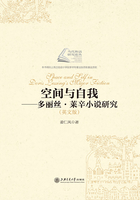
Introduction
Ⅰ.Doris Lessing and Her Achievements
As a Nobel Prize winner in literature,Doris Lessing(1919—2013)unarguably occupies an influential position in the twentieth century British literature.She is a prolific and complex contemporary writer with a great abundance of voluminous works encompassing an assortment of genres:novels,short stories,essays,poetry,science fiction,autobiography,and drama.Her writing covers almost all the important movements and social issues in the twentieth century with such insight and vision that Margaret Drabble acclaims her as“Cassandra in a world under siege”(1986:183).With her particular concern about the individual’s self in certain space,her literary achievements have exerted such an important converting influence on many generations that Drabble perceives her as“the kind of writer who changes people’s lives”(1986:183).Undoubtedly,her remarkable literary output,in terms of both its quantity and quality,has made her an outstanding writer in the history of literature,as is commended:“that epicist of the female experience,who with skepticism,fire and visionary power has subjected a divided civilization to scrutiny”(http://www.nobelprize.org/nobel_prizes/laureates/2007/).
The Grass Is Singing(1950)initiates Lessing into the literary world of Britain with its immediate success after publication as it was reprinted seven times in five months.As“the most promising novel to have appeared in England since the Second World War”(Thorpe,1978:11),the first novel demonstrates Lessing’s initial efforts to explore the individual’s self under collective pressures.The Golden Notebook(1962)marks the rise of an important and eminent novelist.With its profound“transformative”influence on women , it is lauded as“the Bible for the young”which,according to Drabble,“catches the feeling of converted emotion that she arouses”(1986:183).The novel reaches such a literary height with its perfect combination of form and content that Karl observes it as“the most considerable single work by an English author in the 1960’s”(1994:291)and even Harold Bloom,who“takes up the unhappy stance of dissenting from the judgments”(1986:ⅶ)of many critics who applause Lessing’s works,regards it as an“undisputable achievement”(1986:4)which“should endure”(1986:7).As the other of“the two considerable achievements”(Karl,1972:293),The Four-Gated City(1969),which crowns the Children of Violence series,represents Lessing’s new achievement.Martha Quest,together with Mary Turner and Anna Wolf stand out,beyond dispute,in the“central figures in the roll of twentieth-century female literary protagonists.”(Rubenstein,1979:5)And Lessing,with her contribution of the characters who have“the spirit...of the age”(Bloom,1986:7),will remain in the history of literature and human civilization at large.
, it is lauded as“the Bible for the young”which,according to Drabble,“catches the feeling of converted emotion that she arouses”(1986:183).The novel reaches such a literary height with its perfect combination of form and content that Karl observes it as“the most considerable single work by an English author in the 1960’s”(1994:291)and even Harold Bloom,who“takes up the unhappy stance of dissenting from the judgments”(1986:ⅶ)of many critics who applause Lessing’s works,regards it as an“undisputable achievement”(1986:4)which“should endure”(1986:7).As the other of“the two considerable achievements”(Karl,1972:293),The Four-Gated City(1969),which crowns the Children of Violence series,represents Lessing’s new achievement.Martha Quest,together with Mary Turner and Anna Wolf stand out,beyond dispute,in the“central figures in the roll of twentieth-century female literary protagonists.”(Rubenstein,1979:5)And Lessing,with her contribution of the characters who have“the spirit...of the age”(Bloom,1986:7),will remain in the history of literature and human civilization at large.
Space occupies a prominent position in all of the three major novels.The individual’s self is inextricably associated with certain spaces,be it the store in the dusty dorps and conventional town with its color bar in Africa or the various spaces with distinct qualities in the greatest modern city of London,or more prominently,the houses embedded with the potentiality for a real personal space.Although there isn’t fact to show that Lessing has ever been directly influenced by any spatial theory nor has she made any systematic elucidation on space,she does affirm explicitly or implicitly the importance of space.In“Profile of Doris Lessing”produced by BBC Radio,she asserts the marvelous freedom and independence in the vast African landscape:“From my point of view the most important thing was the space,...there was practically nobody around,and I used to spend hours by myself in the bush”(Greene,1994:9).She also implies another kind of freedom one can only find in big cities like London:“In Southern Rhodesia it is not possible to detach yourself from what is going on.This means that you spend all your time in a torment of conscientiousness.In England...you can get on with your work in peace and quiet when you choose to withdraw”(Lessing,1974:48).These may account for the prominence of space in Lessing’s works to some extent.This book explores space in relation with self in the three representative novels by Lessing:the space of surveillance and the repressed self in The Grass Is Singing,the space of alienation and the divided self in The Golden Notebook,the thirdspace and the dissolved and revived self in The Four-Gated City.By a systematic analysis of the space in its relations with the state and the development of the individual’s self in the three major novels,this book attempts to make a contribution to the spatial criticism of Lessing study.